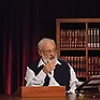Audio Version Of The Blog – 1/27/24
Listen to an Audio Version of the Blog
Download:MP3 Audio

Listen to an Audio Version of the Blog
Download:MP3 Audio
 Baal HaSulam, who wrote a commentary on The Book of Zohar, says that “flower buds” are the action of the beginning of creation. That is, the Kabbalist sort of sees and wants to convey the process of the development of creation, by comparing it with the flower buds that appear in the land. In this way, he gradually reveals to us the beginning of all creation.
Baal HaSulam, who wrote a commentary on The Book of Zohar, says that “flower buds” are the action of the beginning of creation. That is, the Kabbalist sort of sees and wants to convey the process of the development of creation, by comparing it with the flower buds that appear in the land. In this way, he gradually reveals to us the beginning of all creation.
Therefore, in the article “The Flower Buds” we are talking about the evolution of nature in our world until man appears. Then it explains what happens to this man.
It says in the “Introduction of The Book of Zohar“: The flower buds have appeared in the land; the time of pruning has arrived, and the voice of the turtledove is heard in our land (Rashbi, Zohar for All, “The Flower Buds”). It means that the whole of nature at all its levels—still, vegetative, animate, and human—in its development is gradually approaching a state where a person can begin to act as the peak of its creation.
This process is considered an external manifestation of nature’s development, as well as the internal development of a person. After all, everything that happens is carried out at all levels of nature, including the spiritual one.
Question: Let’s say “flower buds in the land” we can understand somehow: the land symbolizes a common desire and the flower buds represent the manifestation of the intention in this desire. What is “the voice of a turtledove is heard”?
Answer: This can be considered as a manifestation of the Creator’s call for a person to begin interacting with all other levels of nature.
[323581]
From KabTV’s “Introduction of The Book of Zohar” 1/7/24
Related Material:
The Goal of Creation Is Perfect Fulfillment
Phases of Development of the Will to Receive
Getting To Know The Plan Of Creation
 The speaking has virtues: 1 – It acts against the will of the Landlord. 2 – It is not confined to its contemporaries like the vegetative, meaning it is independent of the environment. 3 – It also feels others and can, therefore, care for them and complement them (Baal HaSulam, Shamati 115 “Still, Vegetative, Animate, and Speaking”).
The speaking has virtues: 1 – It acts against the will of the Landlord. 2 – It is not confined to its contemporaries like the vegetative, meaning it is independent of the environment. 3 – It also feels others and can, therefore, care for them and complement them (Baal HaSulam, Shamati 115 “Still, Vegetative, Animate, and Speaking”).
To act against the Master’s wishes means to act against the nature that the Creator has placed in us.
The owner, i.e., nature, the Creator, requires one thing from us, and we choose a higher level. We go against the Creator because we do not want to obey our egoistic nature. We want to be above it.
Question: How does a Kabbalist choose whether now he is going against the will of the master or the will of society?
Answer: It is according to one’s perception of their life. That is already felt in a plant, an animal, and even more so at the speaking level.
To move from the speaking level to the human level, we must go through all the previous levels: inanimate, vegetative, animate, and speaking. And then we will achieve a complete sense of nature and accordingly, the Creator in whom we all find ourselves.
[323720]
From the Daily Kabbalah Lesson 1/11/24, Writings of Baal HaSulam “Still, Vegetative, Animate, and Speaking”
Related Material:
Still, Vegetative, Animate And Speaking
From Animal To Man
Breakthrough
 One must always delve in the work of Malchut, called “writing,” considered “ink” and Shacharit [blackness] ( Baal HaSulam, Shamati 122 “Understanding What Is Written in Shulchan Aruch”).
One must always delve in the work of Malchut, called “writing,” considered “ink” and Shacharit [blackness] ( Baal HaSulam, Shamati 122 “Understanding What Is Written in Shulchan Aruch”).
Question: Why is the work of Malchut called the property of ink and blackness? Where do we record this?
Answer: Malchut is the desires of a person, which are initially all egoistic and therefore called blackness.
Recording is what we write with black ink on a white background. In other words, everything that appears to us is drawn to us by our desires (black ink) on the background of white light (Bina).
Question: The article says that sometimes the Sitra Achra helps a person by drawing everything in black light to show his true situation. Can it be said that hardships or some kind of sorrows also help us see ourselves in the true light?
Answer: Of course, they help. A person feels the difference between what is in the heart and what is in the mind and sees that the mouth and the heart are not equal. When one realizes that what one says differs from what one feels, then a person sees what needs to be corrected.
[323568]
From the Daily Kabbalah Lesson 1/7/24, Writings of Baal HaSulam “Understanding What Is Written in Shulchan Aruch”
Related Material:
Who Colored The White Light?
Through The Seven Colors Of The Rainbow To The Simple, White Light
How To Color The Color Black
 Question: How does the speaking level differ from the animal?
Question: How does the speaking level differ from the animal?
Answer: The speaking level differs from the animal level in that it cares about its neighbor, about those who are outside of it.
It can develop so much, feel the other so much that in this way it becomes incorporated into him, saves him, and takes care of him.
Question: But animals also take care of each other. Is there any exceptional factor that will really lift us above the animal level?
Answer: Only the feeling of the Creator. And this is the fourth level, above the speaking level.
[323773]
From the Daily Kabbalah Lesson 1/11/24, Writings of Baal HaSulam “Still, Vegetative, Animate, and Speaking”
Related Material:
From Animal To Man
Still, Vegetative, Animate And Speaking
Grow To Be Human